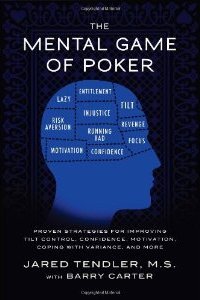Mental Game of Poker Excerpt 1 – Fear
In the next four weeks we will publish four excerpts from The Mental Game of Poker written by Jared Tendler & Barry Carter. Today we have the first excerpt from the book. The book is now available from Amazon.com and Amazon.co.uk.
Fear
In a poker world where everything short of playing your best is called tilt, players barely notice anxiety and fear. Defining tilt as just being caused by anger allows fear to emerge as a real contributor to mental game problems. Fear was there all along, but unless you had the ability to spot it, it’s likely you’d miss its role in causing of problems in your game; many players do. You may not realize that fear can be the cause of struggling to think clearly, constantly checking past hands for mistakes, or why you lack the energy to play.
While you may not experience fear in a big way, it may show up more subtly in one of the following ways:
- Your mind goes blank in big pots.
- You feel rushed for no apparent reason.
- You constantly replay previous hands in your mind.
- You constantly check results, the cashier, or your stack size.
- You play poker only when you’re feeling perfect, so you don’t play much.
- Your mind races and you can’t stop thinking.
- You constantly second-guess decisions.
- You avoid high-variance plays that you know are the right decision.
- You take extra time over a tough decision, but still are not thinking about anything except, “what the hell do I do?”
- You feel overwhelmed about learning the game.
- You regularly lose your train of thought in a hand.
- You’re reluctant to move up in stakes.
- You struggle sleeping after bad sessions.
The Nature of Fear
Fear is an accumulation of anxiety.
Anxiety is an accumulation of doubt or uncertainty.
Uncertainty is essentially a question you don’t have the answer for or don’t have enough experience to prove the answer you already have is correct. When these questions are unanswered or unproven, doubt lingers and eventually accumulates into anxiety. If this goes on long enough, it turns into fear. As with other emotions, fear exists along a spectrum, only it begins as a question.
By digging into your fear, you can pull out the questions that are unanswered or unproven. Uncovering the questions underlying your fear is important because they indicate what you want to know at a deeper level. The following are examples of common questions poker players have:
- “If I can’t beat the fish, how can I ever be successful?”
- “What will I do if online poker goes away, or the games dry up?”
- “Is this the right decision here?”
- “How could I have been so stupid?”
- “When is the bad run going to end?”
- “Why does this always happen to me?”
- “Why can’t I ever play well when I move up in stakes?”
- “Will I ever be able to reach my potential?”
- “Will I make it as a pro?”
- “What will I do if I can’t make it as a pro?”
- “Can I handle another sickening downswing?”
- “Will I wake up one day not being able to win at poker?”
Sometimes these questions often linger in a player’s mind without being answered, while at other times they’re answered automatically with responses such as, “It’s because I’m stupid that I make these mistakes,” “I’ll never be successful if I can’t beat the fish,” “The bad run is never going to end,” or “It’s because I’m just not a good enough player to ever make it as a pro.” These answers only perpetuate fear.
It may seem overly simplistic to reduce fear down to a question, but think about it logically. When you have certainty, there’s nothing to fear. This is why people who have certainty display confidence even when they’re wrong.
If you were 100% sure that online poker was going to be legalized and would lead to a second poker boom, it would be illogical to worry about it going away. If you were 100% sure that your bad run was going to end in 10,000 hands, you wouldn’t think twice about sitting down to play those 10,000 hands as quickly as possible. As simple as it sounds, certainty is the antidote to fear.
Unpredictability or uncertainty alone does not create anxiety, just as anger alone does not create tilt. To reach that level of intensity requires underlying flaws in how you’re approaching and learning poker. The end goal is not to eliminate uncertainty; it’s to correct the underlying flaws in your logic that force you to need certainty when you really don’t want to have it. Without uncertainty, there is no risk. Without risk, there is nothing to gain in poker, no edge to create, and no profit to be made.
The Mental Game of Poker, by Jared Tendler & Barry Carter, is now available at Amazon.com and Amazon.co.uk.

